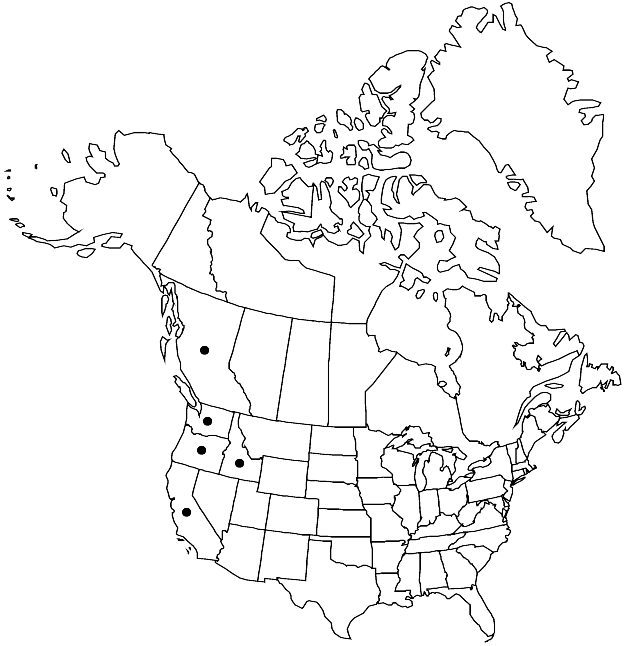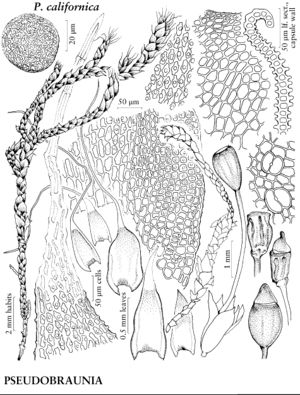Difference between revisions of "Pseudobraunia californica"
in H. G. A. Engler and K. Prantl, Nat. Pflanzenfam. 222[I,3]: 716. 1905.
FNA>Volume Importer |
FNA>Volume Importer |
||
| Line 21: | Line 21: | ||
|name=Hedwigia pilifera | |name=Hedwigia pilifera | ||
|authority=Mitten | |authority=Mitten | ||
| − | }}{{Treatment/ID/Synonym | + | }} {{Treatment/ID/Synonym |
|name=Pseudobraunia californica var. pilifera | |name=Pseudobraunia californica var. pilifera | ||
|authority=(Mitten) Brotherus | |authority=(Mitten) Brotherus | ||
| Line 39: | Line 39: | ||
|elevation=low to moderate elevations (100-1200 m) | |elevation=low to moderate elevations (100-1200 m) | ||
|distribution=B.C.;Calif.;Idaho;Oreg.;Wash. | |distribution=B.C.;Calif.;Idaho;Oreg.;Wash. | ||
| − | |discussion=<p>Pseudobraunia californica is commonly associated with species of Hedwigia on periodically moist rock outcrops. The leaf hair-points are most well developed in the broader branch and stem apices, variously floccose in different populations to sparsely present. The hair-points are absent or nearly so at the stem and branch bases, and they gradually develop apically along the stem. The papillae, one per lumen and stoutly and simply tuberculate, will distinguish this species from many others in the family.</p> | + | |discussion=<p><i>Pseudobraunia californica</i> is commonly associated with species of <i>Hedwigia</i> on periodically moist rock outcrops. The leaf hair-points are most well developed in the broader branch and stem apices, variously floccose in different populations to sparsely present. The hair-points are absent or nearly so at the stem and branch bases, and they gradually develop apically along the stem. The papillae, one per lumen and stoutly and simply tuberculate, will distinguish this species from many others in the family.</p> |
|tables= | |tables= | ||
|references= | |references= | ||
| Line 63: | Line 63: | ||
|publication year=1905 | |publication year=1905 | ||
|special status=Endemic;Selected by author to be illustrated | |special status=Endemic;Selected by author to be illustrated | ||
| − | |source xml=https://jpend@bitbucket.org/aafc-mbb/fna-data-curation.git/src/ | + | |source xml=https://jpend@bitbucket.org/aafc-mbb/fna-data-curation.git/src/8f726806613d60c220dc4493de13607dd3150896/coarse_grained_fna_xml/V28/V28_140.xml |
|genus=Pseudobraunia | |genus=Pseudobraunia | ||
|species=Pseudobraunia californica | |species=Pseudobraunia californica | ||
Revision as of 17:03, 18 September 2019
Stems to 8 cm, stoloniferous. Leaves with hair-points well developed, to 2 mm. Perichaetia with leaf apex irregularly rounded to broadly acute, apiculus absent or short, hyaline.
Phenology: Capsules mature spring.
Habitat: Seasonally dry rock, metamorphic or igneous outcrops in oak woodlands, river canyons and ravines in the Inner Coast Ranges, granite boulders or vertical rock faces, exposed and open mossy granitic terraces and rock outcrops in transition zone of chaparral and oak
Elevation: low to moderate elevations (100-1200 m)
Distribution

B.C., Calif., Idaho, Oreg., Wash.
Discussion
Pseudobraunia californica is commonly associated with species of Hedwigia on periodically moist rock outcrops. The leaf hair-points are most well developed in the broader branch and stem apices, variously floccose in different populations to sparsely present. The hair-points are absent or nearly so at the stem and branch bases, and they gradually develop apically along the stem. The papillae, one per lumen and stoutly and simply tuberculate, will distinguish this species from many others in the family.
Selected References
None.
